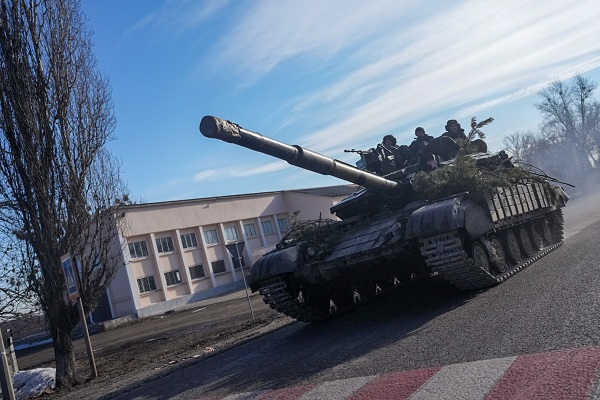Russia crisis sparks fund suspensions
1st March 2022 09:40
by Sam Benstead from interactive investor
Fund managers can no longer effectively trade Russian assets, which has led to fund suspensions being imposed.

Funds investing in Russian assets have been suspended, so far trapping over £1 billion of savers’ cash.
Investors in the JPM Emerging Europe Equity fund, which has total assets of £230 million, can no longer withdraw or add money to the fund. Liontrust Russia has also shut its doors, blocking access to £180 million in assets.
Other suspensions have since followed, including £489 million Barings Eastern Europe, and Pictet Russian Equities, which holds £475 million.
Further fund suspensions could be announced by strategies with notable exposure to Russia in the coming days. Such action is taken by fund management firms to avoid liquidity crises, where redemptions from a fund outpace a fund manager’s ability to raise cash.
Russia is facing severe sanctions from the European Union, US and UK for its invasion of Ukraine last week, which has impacted the Russian companies and sent share prices crashing. There are restrictions on the Russian central bank’s access to its foreign currency reserves and some Russian banks have been removed from the Swift payments system, which limits their ability to operate globally, among other measures.
The Russian central bank has shut its stock market in response to the crisis. As a result, funds with a large amount held in Russia are currently unable to sell stocks to meet investor withdrawals. Funds will typically have a small cash position – of 5% or less – to help manage liquidity. At times of heavy selling such cash buffers can rapidly be depleted.
- The funds, investment trusts and ETFs with exposure to Russia
- Sea of red across global stock markets as Russia invades Ukraine
- Ukraine invasion triggers FTSE 100 slump
JP Morgan said the fund would be suspended indefinitely but that it would review the decision on an ongoing basis. Investors in the fund will still be able to receive dividend payments. The strategy has 68% invested in Russia, including large holdings in oil firms Gazprom (LSE:OGZD), Lukoil (LSE:LKOD) and Rosneft (LSE:ROSN).
Liontrust also said it was unable to tell investors when the fund would open again. It has 91% of its assets in Russian companies.
JP Morgan told investors: “Due to the escalating conflict between Russia and the Ukraine, local market trading conditions are not currently operating as they normally would do and accordingly, we are unable to manage the fund in accordance with the investment objective and policy.”
Liontrust said: “We have not taken this action lightly but in this case we believe this is in the best interests of all investors given the events of the past few days and comes after discussions with the fund’s depositary. These events include today’s closure of the Moscow Stock Exchange and the temporary ban on foreign investors selling local Russian securities.”
Other funds investing in Eastern Europe include the £18 million ASI Eastern European Equity, which has 64% in Russia, and the £330 million Barings Eastern Europe, which has 62% in Russia, according to financial data firm Morningstar.
Emerging market funds that have a large proportion of their assets in Russia include GCG Partners Emerging Markets Equity, which has 16% invested in Russia, Baillie Gifford Emerging Markets Leading Companies, which has 10% invested there, and UBS Global Emerging Markets, with 8%.
Investors are still charged fees for funds that are suspended. JPM Emerging Europe Equity levies a 1.66% charge and Liontrust Russia costs 0.95%.
The JPMorgan Russian Securities investment trust (LSE:JRS), whose shares trade on the London Stock Exchange, has lost around half its value in the past two weeks.
Why does liquidity matter?
For an investor, liquidity matters because you can end up not being able to access your money when fund suspensions are put in place. This has happened on a number of occasions for commercial property funds following Covid-19, the Brexit vote and during the financial crisis.
Investment trusts do not suffer the same problem. Under the trust structure, a fixed number of shares is issued, raising a fixed amount of money for the manager to invest in a portfolio of assets. Those shares are traded on a stock exchange and their price fluctuates according to demand and supply. But the fund manager does not have to sell or buy shares depending on whether they are attracting or losing investors.
These articles are provided for information purposes only. Occasionally, an opinion about whether to buy or sell a specific investment may be provided by third parties. The content is not intended to be a personal recommendation to buy or sell any financial instrument or product, or to adopt any investment strategy as it is not provided based on an assessment of your investing knowledge and experience, your financial situation or your investment objectives. The value of your investments, and the income derived from them, may go down as well as up. You may not get back all the money that you invest. The investments referred to in this article may not be suitable for all investors, and if in doubt, an investor should seek advice from a qualified investment adviser.
Full performance can be found on the company or index summary page on the interactive investor website. Simply click on the company's or index name highlighted in the article.